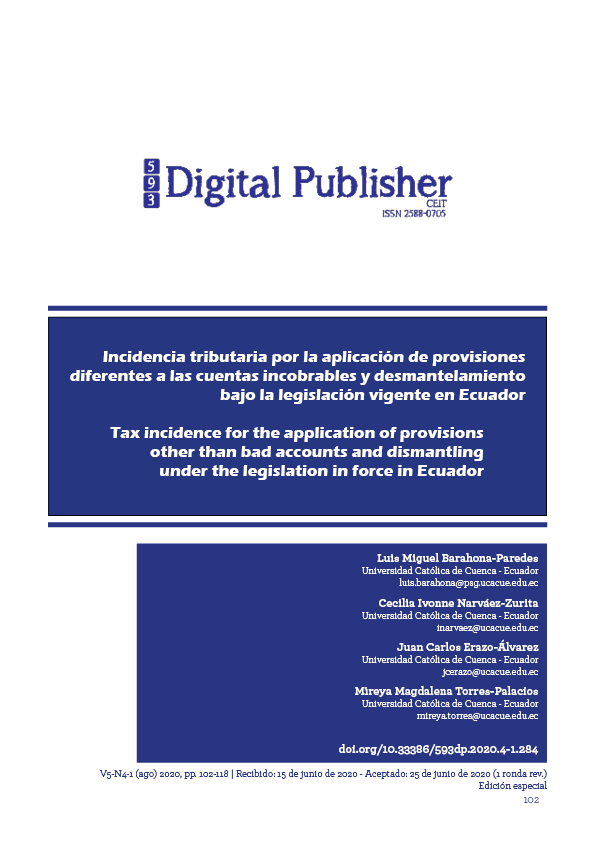Tax incidence for the application of provisions other than bad accounts and dismantling under the legislation in force in Ecuador
Main Article Content
Abstract
Global information systems have undergone substantial changes, adapting to a cutting-edge requirement that seeks to improve data communication using a standard system. The financial economic world is not the exception, for this reason, the International Financial Reporting Standards issued by the International Accounting Standards Board (IASB) were created, which establish requirements for recognition, measurement and presentation of the information to be disclosed in the statements. financial, with the purpose of generating reasonable and valid information for decision making. In this context, Ecuador adopted these standards in 2009 by order of the Superintendency of Companies and Insurance, however, their adoption presented divergences when applying the accounting standard with respect to the tax law. The Internal Revenue Service did not adopt this mechanism since its objective is the collection of taxes, so, in order to avoid conflicts between accounting and tax regulations, the tax law allows the limited application of some aspects of the regulation. accountant. The biggest problem for companies that do not apply deferred taxes lies in the impossibility of clearly and precisely identifying the divergence between the accounting standard and the tax legislation, and then include the assets and liabilities generated by deferred taxes in their financial statements. This work aims to design a tax methodological procedure that allows the application of deferred taxes generated by provisions other than bad debts and dismantling.
Downloads
Article Details
1. Derechos de autor
Las obras que se publican en 593 Digital Publisher CEIT están sujetas a los siguientes términos:
1.1. 593 Digital Publisher CEIT, conserva los derechos patrimoniales (copyright) de las obras publicadas, favorece y permite la reutilización de las mismas bajo la licencia Licencia Creative Commons 4.0 de Reconocimiento-NoComercial-CompartirIgual 4.0, por lo cual se pueden copiar, usar, difundir, transmitir y exponer públicamente, siempre que:
1.1.a. Se cite la autoría y fuente original de su publicación (revista, editorial, URL).
1.1.b. No se usen para fines comerciales u onerosos.
1.1.c. Se mencione la existencia y especificaciones de esta licencia de uso.
References
Alonso, A., & Pousa, R. (2007). Casos Practicos del Nuevo Plan General de Contabilidad.
Amatucci, A. (2001, pag. 242).
Buenaño , C., & Gavilánez , M. (2014). Analisis de los efectos en la apliacación de la NIC 12 sobre los tributos del sector industrial en el distrito metropolitano de Quito.
Cásares Hernández , L. (1999). Tecnicas actuales de investigación documental .
Castro, F. (29 de abril de 2013). Que son los impuestos diferidos. Excelsior, seccion dinero.
Consejo de Normas Internacionales de Contabilidad (IASB). (2009). NIIF para PYMES.
Criollo , S., & Rivera, H. (2012). Analisis del Impuesto Diferido en el impuesto a las Ganancias.
Ferrán, R. (2012). Tratamiento contable de los gastos financieros que superan la cantidad fiscalmente deducible.
Flores, P. A. (2018). Cálculo del impuesto diferido y su impacto en el impuesto a la renta de las empresas controladas por la superintendencia de compañias en el cantón Ambato.
Giullianni, C. (1962). Derecho Financiero.
Hansen, M. (2011). Manual para implementar las Normas de Información Financiera.
Hernández Sampieri , R. (2014). Metodologia de la Investigación .
http://catarina.udlap.mx/u_dl_a/tales/documentos/ledf/romero_g_pm/capitulo3.pdf. (s.f.).
http://revistas.pucp.edu.pe/index.php/derechoysociedad/article/view/17169/17458. (s.f.).
International Federation for System Research, (IFRS). (2018). Normas NIIF®PARTE A.
Jarach, D. (1947). Teoria General de Derecho Tributario Sustantivo. Buenos Aires: Edit. de la Revista de Jurisprudencia Argentina S.A.
Ley de Regimen Tributario Interno. (2018).
Mena, R. P., Narváez , C. I., & Erazo , J. C. (2019). La planificación tributaria como herramienta financiera para la optimización de los recursos empresariales. 593 Publisher.
NIC 12 . (2001).
Novoa, G. (2017). El Principio de la Capacidad Contributiva. Lima.
Saltos , M. (2017). LOS PRINCIPIOS GENERALES DEL DERECHO TRIBUTARIO.
Segarra, N. D., Narváez , C. I., & Erazo , J. C. (2019). Las estrategias tributarias como herramientas de optimización del pago de impuesto a la renta. Caso: empresa Mantening Ingeniería. 593 Publisher.
Ureña , S. (2015). Principio de la capacidad contributiva como principio rectos del regimen tributario ecuatoriano.
Vargas, C. (2011). Contabilidad Tributaria. Ecoe ediciones, 96.





